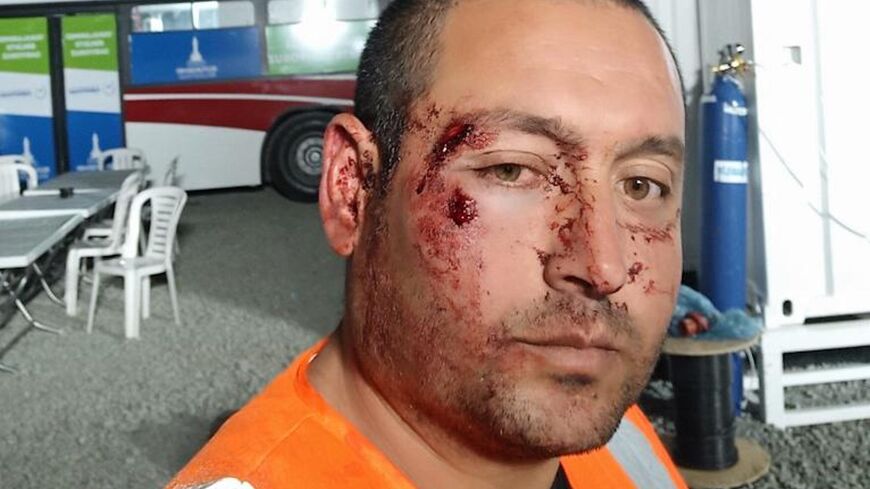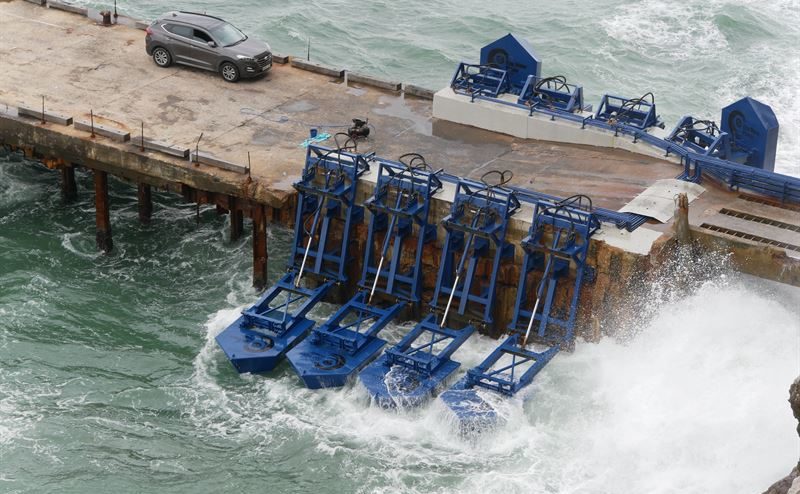Turkey’s earthquake victims face torture and abuse by security forces, rights groups say
Omer Turkmen, a victim of the massive earthquakes that killed over 50,000 people and obliterated large swathes of southern Turkey on Feb. 6, thought police officials were going to provide him with a tent and food as temperatures dipped below zero in his native Antakya, the worst affected province of all.
What he got instead was a thorough beating that left him with memory loss and in a state of constant fear.
“They asked me for my ID, and when they saw I had a criminal record for smuggling diesel from Syria, everything changed,” Turkmen told Al-Monitor about his encounter with the police on Feb. 24. “There were around 10 of them, all special police forces. They started beating with their bare hands, with their rifle butts. They kicked me all over. They called me bad names and threatened to kill me, calling me a thief,” Turkmen sobbed. “I did nothing. I was just asking for help, for some shelter. I’ve been sleeping in my car ever since the earthquakes. I have no work. Not only has the state done nothing for us, but they are also treating us like criminals,” Turkmen said. His two nephews, Mehmet Ali and Nizam Dogan, who were present at the scene, tried to help him. They got a thrashing too.
The seemingly random violence applied by security forces in the earthquake zone, where emergency rule remains in force, has already resulted in the death of one person in custody as previously reported by Al-Monitor. “It is as if the earthquake gave them the opportunity to reveal their true faces, to act with unfettered impunity,” said Umit Buyukdag, secretary general of the independent Progressive Lawyers’ Association, which is investigating abuses in the region. In most cases, victims are accused of theft and looting, often with no proof to substantiate the claim.

Omer Turkmen is seen here following the Feb. 24 attack. (Image courtesy of Turkmen)
Buyukdag told Al-Monitor that the chaotic environment and lack of state oversight in the disaster area have made things worse. “Imagine a landscape of crumpled buildings, pitch dark nights with no electricity, freezing cold weather and the knowledge that dead bodies remain unrecovered under the ruins. It’s an environment that encourages the worst instincts,” Buyukdag explained. Her advocacy group recorded instances of security officials roaming around in civilian clothes and unmarked cars with no license plates. It was as if they were hunting for victims, Buyukdag said.
The state of emergency, which was unnecessary to start with, according to Buyukdag, “serves as further cover for lawlessness among security officials who are confident they won’t face the consequences.”
The state of emergency during a natural disaster grants the government powers to issue decrees to use private and public assets in rescue and relief efforts. It also authorizes the deployment of military forces to assist in the work and restricts movements into the quake zone. Buyukdag contended that Turkish President Recep Tayyip Erdogan’s “one-man system,” which concentrates power in his hands, allows the government to take all those measures without resorting to emergency powers.
Human Rights Watch and Amnesty International asserted in a joint report released today that they had documented 13 cases of violence perpetrated by police and gendarmerie in the quake zone, involving 34 male victims — including Turkmen and his nephews. Syrian refugees have become prime targets amid a groundswell of anti-immigrant hostility that is gripping the country ahead of fateful elections that are scheduled to be held on May 14.
Most said they were assaulted while involved in search and rescue efforts of buildings destroyed by the earthquake or while passing through neighborhoods in Antakya, the report noted. One case involved five young Kurdish men from Diyarbakir, the Kurds’ unofficial capital, who had traveled to Adiyaman as volunteers. They were hauled off by gendarmes from a search and rescue site and beaten. An hour later they were transferred to a police station where they were set upon by 30 police officers who punched, kicked and beat them with “hands, batons and sticks.” On their way over they were warned that if they so much as moved, their brains would be blown out. “Some police officers apparently recorded the torture on their phones. Then the police seized their phones, IDs, wallets and clothes, leaving the men in their underwear,” the rights watchdogs noted.
Seven Syrian refugees interviewed by the rights groups said they had been addressed by security forces with “the hateful ‘Syrian, do this; Syrian, do that’” and called “traitor” and “thief.” The verbal abuse often escalated to physical violence and beatings.
Torture is a criminal offense in Turkey. Yet in response to Amnesty International and Human Rights Watch, the Ministry of Justice described the claims documented in the report as “vague” and “devoid of factual basis.” Several investigations are being carried out, and some officers were suspended after victims pressed charges. However, Buyukdag aired skepticism that they would result in any convictions.
The abuse is far from limited to the earthquake zone. Torture and ill treatment under police detention have become commonplace and sharply escalated in the wake of the failed attempt to overthrow Erdogan in 2016. “The whole country has virtually become a space of torture today because of the political power’s mode of government based on repression and control,” Turkey’s Human Rights Association and Human Rights Foundation observed in a recent report.
Kurds and Syrians are bearing the brunt of it. Five police officers are being investigated following the kidnapping and beating of a 14-year-old Kurdish boy in Diyarbakir. Last week three Kurdish workers in Bodrum, a seaside resort, were attacked by a group with air guns, scythes and metal rods because they were addressing each other in the Kurdish language, according to one of the victims. This week a car with a Diyarbakir license plate was attacked by another mob in the western city of Bursa where anti-Kurdish violence is on the rise.
Impunity extends beyond Turkey’s border to swathes of northern Syria that are under Turkish control. At least four Kurds were killed when Turkish-backed Sunni fighters of the Ahrar al-Sharqiya group opened fire on a Kurdish family as it was celebrating Newroz, the Kurdish New Year, in the town of Jinderes on March 20. The killings prompted a rare rebuke from the State Department. The US Embassy in Syria, which has been physically shuttered since the start of the Syrian conflict in 2011, said the attack “threatens Syria’s stability” and called for accountability.
“It is very clear that the victims were targeted because they were Kurds. It was a hate crime based on their ethnicity,” Bassam al-Ahmed, a Syrian human rights activist and founder of Syrians for Truth and Justice, which documents abuses in Syria, told Al-Monitor.



